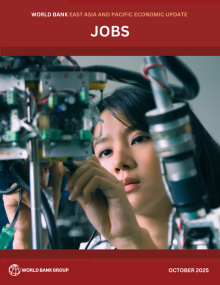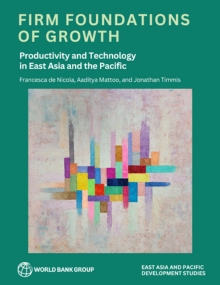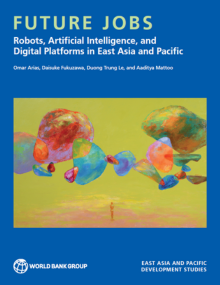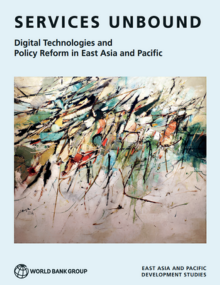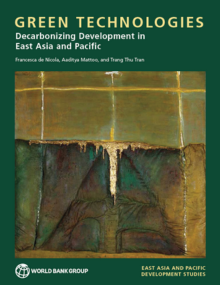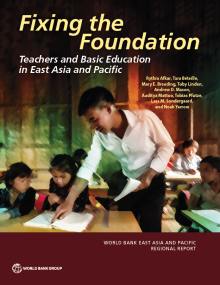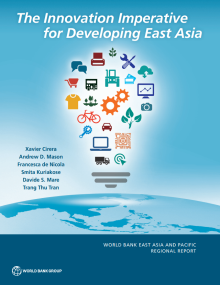East Asia and Pacific Chief Economist Office Reports
Economic Update Reports
VIEW ALL ArrowJobs
EAP's exports now face higher trade restrictions, elevated policy uncertainty, and slowing global growth. And its workers must cope with the growing use of robots, AI, and digital platforms. Download "Jobs" to learn how reforms can expand economic opportunities and improve human capacities to generate better jobs.
A Longer View
Explore the current growth dynamics of the East Asia and Pacific region, which is being shaped by both external and domestic developments. Download "A Longer View" and learn about our three-pronged policy response to boost productivity, expand economic opportunities, and enhance resilience.
Jobs and Technology
East Asia and the Pacific, seen in the context of the world economy, stands out as a paragon of development. The region continues to grow relatively fast, and the benefits are widely shared. But the region also faces challenges. How are global tensions shaping trade and investment? How will increasing global uncertainty impact countries in the region? How are new technologies like robots, AI and digital platforms affecting jobs and wages? What can be done to ameliorate disruptions for workers?
Firm Foundations of Growth
The East Asia and Pacific (EAP) region is growing faster than the rest of the world, but slower than before the pandemic. While recovering global trade and easing financial conditions will support regional economies, increased protectionism and policy uncertainty will dampen growth. Amid macroeconomic turbulence, strong microeconomic foundations are critical for longer-term growth. Firms play a pivotal role in driving productivity, but leading firms in the region are not fully leveraging new technologies. How can these firms catch up with global leaders? What can be done to spur productivity growth?
Services for Development
Most economies in developing East Asia and Pacific, other than several Pacific Island Countries, have recovered from the succession of shocks since 2020 and are continuing to grow, albeit at a slower pace. High indebtedness, a slowdown in China economy, and trade and industrial policy in other countries will hurt the region. Looking forward, diffusion of digital technologies and policy reforms in the services sector is posed to create opportunities and play an increasing role in the economic development of the region.
Flagship Reports
VIEW ALL ArrowFirm Foundations of Growth: Productivity and Technology in East Asia and ...
The most productive (so-called frontier) firms in East Asia and Pacific are falling further behind global leaders, especially in the digital-intensive sectors that drive innovation. Synchronized reforms to improve competition, digital infrastructure, and skills can reignite productivity growth.
Future Jobs: Robots, Artificial Intelligence, and Digital Platforms in East ...
New technologies have boosted employment in East Asia and Pacific countries, with productivity and scale gains outweighing automation’s labor-displacing effects. However, the benefits have been uneven, favoring skilled workers while some less-skilled workers, in more routine and manual jobs, have been pushed into the informal sector. Looking ahead, digitization will enhance the tradability of services, and artificial intelligence (AI) will transform production processes. EAP countries can benefit by equipping workers with the necessary skills and opening the services sectors to trade and investment.
Services Unbound: Digital Technologies and Policy Reform in East Asia and the ...
Services are often seen as slow to change and difficult to export or reform. However, a combination of technological change and policy reform is transforming services into the most dynamic part of many economies. In East Asia and Pacific (EAP), a region associated with manufacturing-led growth, services are already driving development.
Green Technologies: Decarbonizing Development in East Asia and Pacific
East Asia is helping the rest of the world decarbonize and encouraging the domestic adoption of renewable energy. But there is an imbalance: Even as the region’s innovation and investment improve global access to green technologies, the region’s own emissions continue to grow, because of the reluctance to penalize carbon-intensive technologies.
Fixing the Foundation: Teachers and Basic Education in East Asia and Pacific
This report examines key factors affecting student learning in the region, with emphasis on the central role of teachers and teaching quality. It also analyzes the role education technologies, which came into widespread use during the pandemic, and examines the political economy of education reform.
Enterprising Women
This report explores gender differences in entrepreneurship for micro, small, and medium enterprises in Southeast Asia. It analyzes household and firm-level data from five Southeast Asian countries: Cambodia, Indonesia, Lao People’s Democratic Republic, Timor-Leste, and Vietnam, and reviews existing evidence from across the region.
The Innovation Imperative for Developing East Asia
This report seeks to deepen policy makers’ understanding of the critical role for innovation in the future growth and development of developing East Asia. To achieve this, the report examines the region’s key innovation challenges, assesses its state of innovation, and analyzes the main constraints firms face in effectively pursuing innovation.
